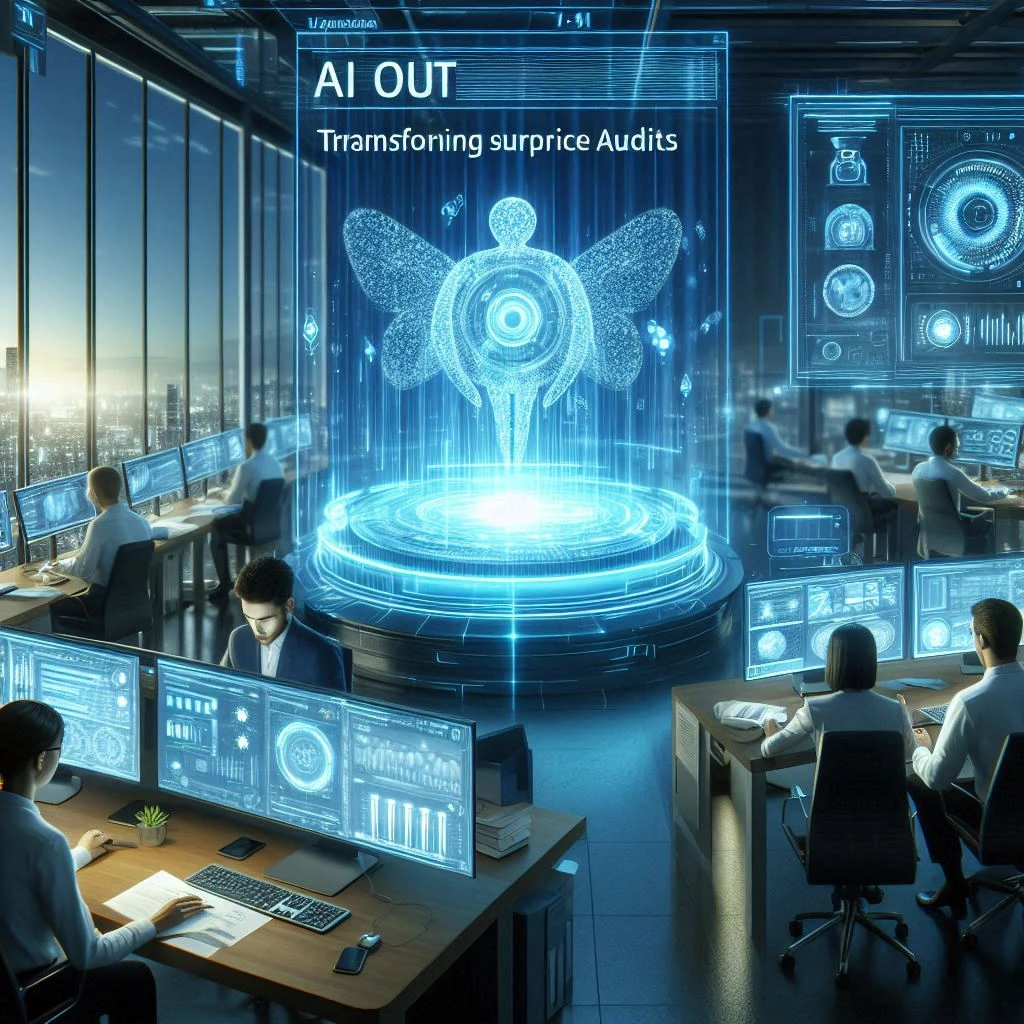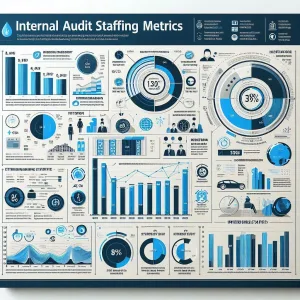Introduction to Surprise Audits
Surprise audits are an essential component of internal audit practices, designed to assess an organization’s compliance and risk management strategies without prior notice. These audits serve as a proactive measure to deter fraudulent activities and ensure adherence to established policies and regulations.
Definition of Surprise Audits
A surprise audit is an unannounced examination of an organization’s financial records, processes, and controls. Unlike regular audits, which are scheduled in advance, surprise audits aim to catch potential discrepancies or fraudulent activities off-guard. This unpredictability is crucial as it prevents employees from taking steps to conceal any wrongdoing, thereby enhancing the integrity of the audit process [5][9].
Importance of Surprise Audits in Risk Management and Compliance
Surprise audits play a significant role in risk management and compliance for several reasons:
- Deterrence of Fraud: The mere presence of surprise audits can discourage potential fraudsters within an organization. When employees are aware that audits can occur at any time, they are less likely to engage in fraudulent behavior [5][8].
- Early Detection of Issues: These audits can uncover discrepancies and compliance issues that may go unnoticed during regular audits. Organizations that implement surprise audits typically experience a shorter duration of fraud schemes, with median detection times significantly lower than those that do not conduct such audits [8].
- Enhanced Compliance: Regularly scheduled surprise audits help ensure that organizations remain compliant with relevant laws and regulations, thereby reducing the risk of legal penalties and reputational damage [3].
Overview of Traditional Methods Used in Conducting Surprise Audits
Traditionally, surprise audits involve several key methodologies:
- Data Analysis: Auditors often perform in-depth data analysis to identify unusual patterns or transactions that may indicate fraudulent activity. This analysis can include reviewing financial statements, transaction records, and other relevant documentation [1].
- Interviews: Conducting interviews with employees and potential witnesses is a common practice during surprise audits. These discussions can provide insights into operational practices and highlight areas of concern that may require further investigation [1].
- Physical Inspections: In some cases, auditors may conduct physical inspections of assets and inventory to verify their existence and condition, ensuring that records align with actual holdings [1].
Surprise audits are a vital tool in the internal auditor’s arsenal, providing a robust mechanism for risk management and compliance. As technology, particularly artificial intelligence, continues to evolve, the methods and effectiveness of surprise audits are likely to transform, offering even greater insights and efficiencies in the auditing process.
The Rise of AI in Internal Auditing
The integration of artificial intelligence (AI) into internal auditing, particularly in the realm of surprise audits, is revolutionizing how organizations approach risk management and compliance. As internal auditors and IT professionals navigate this evolving landscape, understanding the implications of AI technologies is crucial.
Overview of AI Technologies Relevant to Auditing
AI technologies, including machine learning and data analytics, are becoming increasingly relevant in the auditing sector. These tools enable auditors to:
- Analyze Large Data Sets: Machine learning algorithms can process vast amounts of data quickly, identifying patterns and anomalies that may indicate potential fraud or compliance issues. This capability is particularly beneficial in surprise audits, where auditors need to scrutinize high-risk areas such as inventory and receivables [1].
- Enhance Predictive Analytics: AI can help predict potential risks by analyzing historical data and trends, allowing auditors to focus on areas that require immediate attention. This proactive approach can significantly reduce the duration of undetected fraud, which averages 18 months in organizations that do not conduct surprise audits, compared to just nine months in those that do [5].
- Automate Routine Tasks: By automating repetitive tasks such as data entry and preliminary analysis, AI frees up auditors to focus on more complex and strategic aspects of the audit process [12].
Statistics and Trends Showcasing the Adoption of AI in Auditing
The adoption of AI in the auditing field is on the rise, with several key statistics highlighting this trend:
- According to the “Occupational Fraud 2024: A Report to the Nations” by the Association of Certified Fraud Examiners (ACFE), organizations that implement surprise audits alongside other antifraud measures, including AI-driven data analysis, can reduce fraud loss and duration by over 50%.
- A growing number of internal audit teams are prioritizing AI technologies, with many recognizing the need to leverage AI to enhance efficiency and productivity. Recent surveys indicate that the inability to effectively utilize AI is seen as a significant strategic risk by Chief Audit Executives (CAEs) [14].
Benefits of Integrating AI into the Auditing Process
The integration of AI into surprise audits offers numerous benefits:
- Increased Efficiency: AI streamlines the auditing process, allowing for quicker identification of discrepancies and potential fraud. This efficiency is crucial during surprise audits, where time is of the essence [4].
- Improved Accuracy: By minimizing human error and bias, AI enhances the accuracy of audit findings. This is particularly important in high-stakes environments where compliance and regulatory adherence are critical [9].
- Enhanced Risk Management: AI tools can continuously monitor transactions and activities, providing real-time insights that help auditors stay ahead of potential issues. This capability is essential for maintaining robust internal controls and ensuring compliance with regulations [2].
The rise of AI in internal auditing, especially in the context of surprise audits, is reshaping the landscape of risk management and compliance. By leveraging advanced technologies, internal auditors can enhance their effectiveness, ensuring that organizations remain vigilant against fraud and operational inefficiencies. As this trend continues to evolve, it is imperative for internal auditors and IT professionals to stay informed and adapt to these technological advancements.
Transformative Impact of AI on Surprise Audits
The integration of artificial intelligence (AI) into internal auditing practices is revolutionizing the way surprise audits are conducted. This transformation is particularly significant for internal auditors and IT professionals, as it enhances efficiency, accuracy, and the overall effectiveness of the audit process. Here are some key points illustrating how AI is reshaping the landscape of surprise audits:
- Automation of Data Collection and Analysis: AI technologies streamline the data collection process by automating the gathering of relevant information from various sources. This automation not only saves time but also reduces the potential for human error, allowing auditors to focus on more strategic tasks. By leveraging AI, surprise audits can be conducted more efficiently, ensuring that auditors have access to comprehensive and accurate data when they need it most [1][11].
- Enhanced Predictive Analytics: One of the most powerful applications of AI in surprise audits is its ability to utilize predictive analytics. AI algorithms can analyze historical data and identify patterns that may indicate high-risk areas within an organization. This capability allows auditors to prioritize their focus on specific departments or processes that are more likely to require scrutiny, thereby increasing the effectiveness of surprise audits and ensuring that resources are allocated where they are needed most [3][10].
- Real-Time Monitoring and Continuous Auditing: AI facilitates real-time monitoring of financial transactions and operational processes, enabling continuous auditing practices. This means that auditors can detect anomalies and potential issues as they occur, rather than waiting for scheduled audits. The ability to conduct surprise audits on a continuous basis enhances compliance and risk management, as organizations can respond to issues promptly and effectively [2][11][15].
The transformative impact of AI on surprise audits is profound. By automating data collection and analysis, enhancing predictive analytics, and enabling real-time monitoring, AI is not only improving the efficiency of surprise audits but also elevating their strategic value within organizations. As internal auditors and IT professionals embrace these advancements, they will be better equipped to navigate the complexities of modern auditing and ensure robust oversight of organizational processes.
Challenges and Considerations
As artificial intelligence (AI) continues to reshape the landscape of surprise audits, internal auditors and IT professionals must navigate several challenges and ethical considerations to ensure effective implementation. Here are some key points to consider:
- Data Privacy and Security Concerns: The integration of AI in surprise audits raises significant data privacy and security issues. AI systems often require access to vast amounts of sensitive data, which can expose organizations to risks if not managed properly. Internal auditors must ensure that robust data protection measures are in place to safeguard confidential information and comply with relevant regulations. This includes implementing encryption, access controls, and regular audits of data handling practices to mitigate potential breaches and unauthorized access [6][11].
- Integration Challenges with Existing Audit Frameworks: Incorporating AI into established audit frameworks and systems can be complex. Many organizations may face difficulties in aligning AI technologies with their current processes, tools, and methodologies. This integration challenge can lead to inconsistencies in audit practices and may require significant investment in training and resources to ensure that staff are equipped to work with new technologies. Internal auditors must assess their existing frameworks and identify areas where AI can be effectively integrated without disrupting the overall audit process [10].
- Importance of Human Oversight and Ethical Considerations: While AI can enhance the efficiency and accuracy of surprise audits, it is crucial to maintain human oversight throughout the auditing process. Ethical considerations must be at the forefront of AI implementation, as reliance on automated systems can lead to biases and errors if not monitored. Auditors should establish clear policies regarding the responsible use of AI tools, including regular evaluations of AI outputs and ensuring that human judgment is applied in decision-making processes. This human-led approach is essential to uphold the integrity of the audit and address any ethical dilemmas that may arise from AI usage [15][11].
While AI presents exciting opportunities for transforming surprise audits, internal auditors and IT professionals must remain vigilant about the associated challenges and ethical considerations. By addressing data privacy, integration issues, and the need for human oversight, organizations can leverage AI effectively while maintaining the trust and integrity of their audit processes.
Future Trends in Surprise Audits with AI
As artificial intelligence (AI) continues to evolve, its impact on surprise audits is becoming increasingly significant. This section explores the emerging technologies, shifts in auditor roles, and the necessity for continuous learning in the auditing profession.
Emerging AI Technologies Impacting Surprise Audits
- Machine Learning and Predictive Analytics: These technologies enable auditors to analyze vast amounts of data quickly, identifying patterns and anomalies that may indicate areas requiring surprise audits. By leveraging predictive analytics, auditors can anticipate potential risks and focus their efforts more strategically, enhancing the effectiveness of surprise audits [1][12].
- Natural Language Processing (NLP): NLP can be utilized to analyze unstructured data, such as emails and reports, allowing auditors to uncover insights that may not be immediately apparent. This capability can lead to more informed decisions about when and where to conduct surprise audits [1][12].
- Continuous Auditing: AI facilitates continuous auditing practices, where data is monitored in real-time. This shift allows for more frequent surprise audits, as auditors can receive alerts about unusual transactions or behaviors as they occur, rather than relying solely on periodic reviews [12][13].
Shifts in the Role of Internal Auditors
- From Data Gatherers to Analysts: With AI handling the heavy lifting of data analysis, internal auditors will increasingly transition from data collection roles to analytical positions. This shift will enable them to focus on interpreting results, investigating flagged anomalies, and providing strategic insights to management [9][10].
- Enhanced Risk Management: As AI tools become more integrated into the auditing process, auditors will play a crucial role in risk assessment and management. They will need to understand AI outputs and apply their professional judgment to evaluate risks effectively, ensuring that surprise audits are both timely and relevant [12][15].
- Collaboration with IT Professionals: The reliance on AI will necessitate closer collaboration between internal auditors and IT professionals. Auditors will need to work alongside IT teams to understand the technology’s capabilities and limitations, ensuring that audits are conducted effectively and securely [11][15].
Importance of Continuous Learning and Adaptation
- Staying Current with Technology: As AI technologies evolve, internal auditors must commit to continuous learning to stay abreast of new tools and methodologies. This ongoing education will be essential for effectively leveraging AI in surprise audits and maintaining audit quality [10][11].
- Adapting to Changing Environments: The auditing landscape is rapidly changing, and auditors must be adaptable to new challenges and opportunities presented by AI. This adaptability will be crucial for maintaining relevance and effectiveness in their roles as the profession evolves [12].
- Emphasizing Ethical Considerations: As AI becomes more prevalent in auditing, ethical considerations surrounding data privacy and algorithmic bias will become increasingly important. Auditors will need to ensure that their use of AI aligns with ethical standards and best practices, fostering trust and integrity in the audit process [11][15].
The integration of AI into surprise audits is set to transform the auditing landscape significantly. By embracing emerging technologies, adapting their roles, and committing to continuous learning, internal auditors can enhance their effectiveness and ensure that surprise audits remain a vital tool for risk management and organizational integrity.
Conclusion
In conclusion, the integration of artificial intelligence (AI) into surprise audits is revolutionizing the internal audit landscape, offering unprecedented opportunities for efficiency and effectiveness. Here are the key takeaways regarding the transformative role of AI in surprise audits:
- Enhanced Detection and Analysis: AI tools enable auditors to analyze vast datasets quickly, identifying anomalies and high-risk areas that may otherwise go unnoticed. This capability significantly improves the auditor’s ability to detect fraudulent activities during surprise audits, thereby reducing the duration and impact of fraud schemes [14].
- Improved Audit Processes: The element of surprise is crucial in audits, and AI allows auditors to adopt innovative approaches, such as starting with high-risk areas like receivables or vendor invoices rather than traditional methods. This adaptability not only enhances the effectiveness of audits but also keeps fraud perpetrators on their toes [7][9].
- Proactive Risk Management: By leveraging AI, internal auditors can proactively assess risks and implement controls that are more aligned with the current threat landscape. This proactive stance is essential in a world where fraud tactics are continually evolving [12][15].
As we move forward, it is imperative for internal auditors and IT professionals to explore and embrace AI tools that can enhance their audit practices. The potential benefits are substantial, and those who adapt will be better positioned to safeguard their organizations against fraud.
Moreover, staying informed about the latest developments in AI and their implications for the auditing field is crucial. Continuous learning and adaptation will ensure that internal auditors remain at the forefront of effective audit practices, leveraging technology to not only meet but exceed the expectations of stakeholders.
In summary, the future of surprise audits is bright with AI, and embracing this technology will empower auditors to conduct more thorough, efficient, and impactful audits.
Find out more about Shaun Stoltz https://www.shaunstoltz.com/about/
This post was written by an AI and reviewed/edited by a human.



